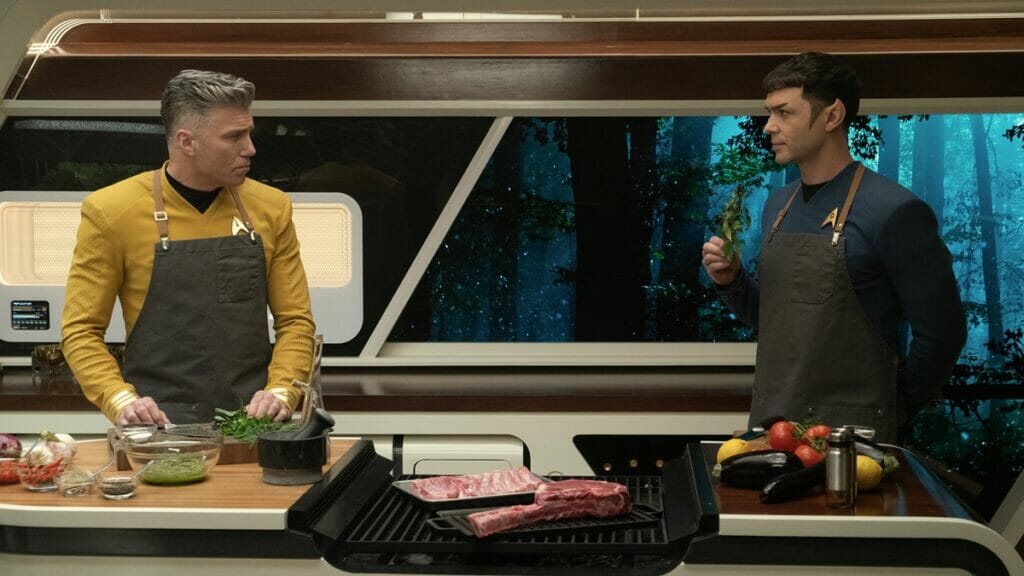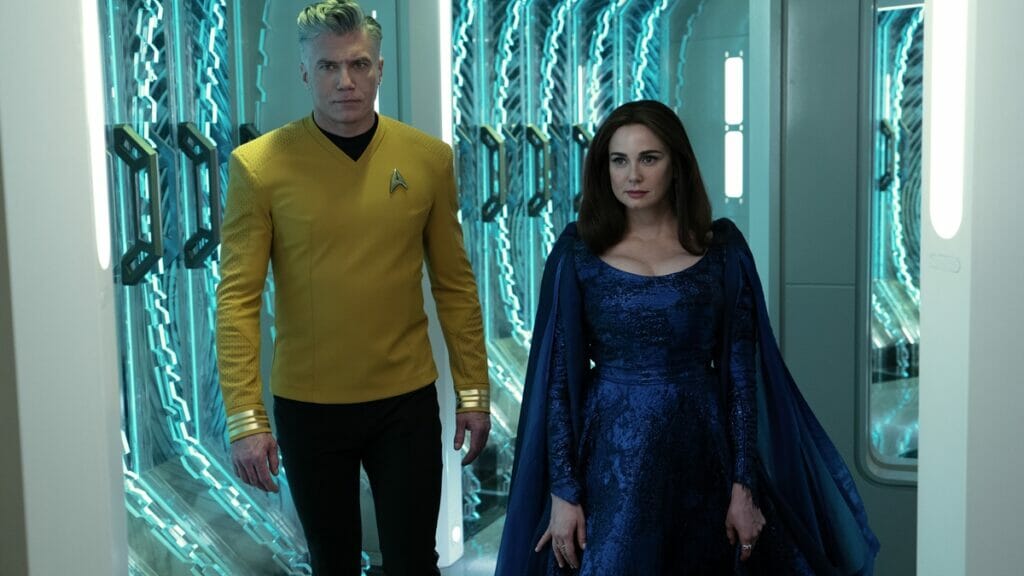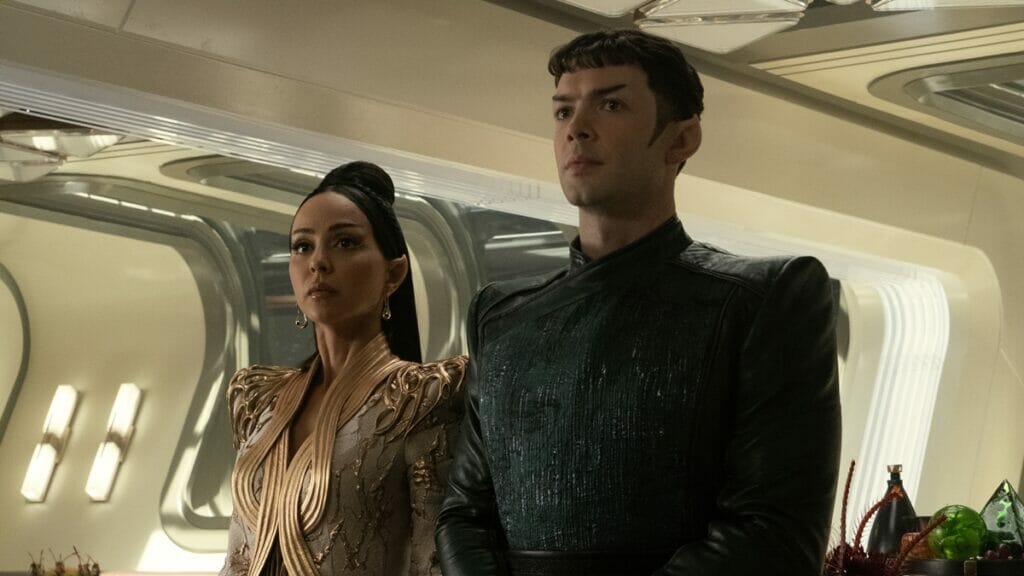A hilarious high-concept farce gives way to a subtle commentary on prejudice, self-acceptance, and quiet strength.
The Original Series loved to find excuses for Spock to drop his Vulcan stoicism for a little while. It could be a dose of alien spores, some inhibition-removing contagion, or, heaven forbid, a love potion from none other than Harry Mudd. But whatever the cause, Leonard Nimoy was too good in the role, and the power of seeing his normally stiff-upper-lipped Vulcan out-of-control was too much for the writers to resist.
The early Star Trek shows would typically use these moments for terror or even tragedy. They were a testament to Spock’s self-discipline. He had the strength to quiet the sleeping volcano that was his psyche, something made manifest when he threatened Captain Kirk or Dr. McCoy with an unassuming menace in compromised moments. More poignantly, those few instances where his emotions came spilling out gave viewers his sense of loss and longing at having to quell those feelings in the name of duty when part of him would dearly like to give in.
But with “Charades,” Strange New Worlds boldly goes someplace new with the idea of Spock dropping his practiced Vulcan calm – to comedy! One of those chance-but-inevitable encounters with a super-advanced energy being results in their cleansing Spock (Ethan Peck) of his Vulcan side and rendering him fully human. What ensues is not something frightening or mournful but rather hilarious! The transformation gives Spock what is essentially a second adolescence. He snacks constantly. He laughs uncomfortably hard at mild jokes. And much to the chagrin of Sam Kirk, he takes messy conference room tables frighteningly seriously.

Peck shines with the opportunity to take Spock off the leash, bringing a Beck Bennett-like energy to this newly teenage, bro-y yet endearing version of the typically sensible Vulcan. It would be easy for a concept this goofy to feel like too much (or not enough), but Peck anchors it in place with a performance that leans into the silliness while still retaining Spock’s humanity.
The uninhibited Spock struggling to adjust to his new circumstances while continuing to perform his duties would have been more than enough material for an episode. But “Charades” takes things a step further with a farce worthy of Frasier. It turns out Spock’s slight aberration just so happens to come right before his all-important engagement dinner with his skeptical future in-laws. Given his human heritage, they’re already resistant to the match, and keeping up the facade under their ill-met scrutiny is more than this semi-teenager can manage.
The setup is excellent fodder for comedy. The writing here is superb, with great setups and payoffs at every turn. Spock’s mother, Amanda Grayson (Mia Kirshner, reprising the role from Discovery), trains him on the rituals he’ll need to perform during the Vulcan engagement ceremony. That concept brings the laughs in a montage of his initial missteps but also solid tension when he has to perform them for real in front of his glowering mother-in-law. The ticking clock of a possible cure arriving before his toughest test, and Captain Pike’s (Anson Mount) as a co-conspirator who stalls by insisting on some earthbound pantomime, only add to the great energy of the episode.
[W]ith “Charades,” Strange New Worlds boldly goes someplace new with the idea of Spock dropping his practiced Vulcan calm – to comedy!
And yet, as befits Star Trek, there is potent social commentary beneath the comedy. The optics of the cultural melding at play are striking, given that Spock’s fiancée, T’Pring (Gia Sandhu), and her parents are played by South Asian actors. But in-text, the episode also makes hay of the fact that T’Pring’s mother is plainly racist against humans, something that puts into stark relief the difficulties of the evening on all fronts.
There’s some well-observed humor in the awkwardness of a social obligation held at the behest of an exacting matriarch and some unfortunate truth in the weathered sting of her unfair judgments. More broadly, these scenes speak to the challenges faced by many in mixed marriages of all stripes, where the blend of two cultures and close-minded resistance to it from the old guard can create stress for those well-meaning souls trying to bind their lives together.

Despite that commentary, the ultimate thrust of “Charades” is to pull the trigger on a relationship between Spock and Nurse Chapel (Jess Bush) that certain inveterate shippers have been hoping for as far back as 1966. And yet, the best takeaways of the episode center on the guest characters of the hour and how the stress of the titular charade affects them.
Once the dust settles, the evening can only be considered a (measured) success, that is, until the ruse is revealed. Spock may have succeeded in fooling his in-laws for a night, but T’Pring is understandably stung by him pulling the wool over her eyes as well. In an outing that leans into the genuine passion between Spock and Christine, it’s nice to see “Charades” acknowledge the way Spock’s actions, however well-intentioned, are hurtful and unfair to his fiancée, and not just fuel for the main characters’ star-crossed dalliance.
More than that, in an episode centered on themes of undue cultural rejection, it’s canny of the writers to focus T’Pring’s hurt on the fact that, whatever her mother’s prejudices, T’Pring herself always embraced and accepted Spock’s humanity. It’s a deft choice to make the forbidden romance that Strange New Worlds fans have clamored for come at an acknowledged emotional cost.

Even better, the episode gives Amanda Grayson her due. Being fully human and maintaining his composure for just an evening helps Spock recognize the incredible fortitude his mother shows through taking such prejudice in good grace every day on Vulcan.
So much of Star Trek is about broadening one’s perspective. Using the tomfoolery here to help Spock understand his mother’s plight and perseverance in a way he’d taken for granted while also providing another sideways glimpse of prejudice is great. It speaks to the scores of people like Amanda, rife with quiet strength, moving deftly through circles that hold them at arm’s length and helping the next generation do better despite that unfair burden.
Guest characters aside, this is also a good episode for Nurse Chapel and Spock, independent of the romance “Charades” builds to. This may be Christine at her most noble. She risks life and limb to reestablish contact with the doctrinaire aliens who eliminated Spock’s Vulcan DNA in the first place. She goes out of her way to help him survive the engagement dinner when it devolving into disaster would only benefit her.
It speaks to the scores of people like Amanda, rife with quiet strength, moving deftly through circles that hold them at arm’s length and helping the next generation do better despite that unfair burden.
Most of all, she loves the complete Spock. In his fully-human state, Spock offers Christine some unexpected but genuine solace, some empathy, and even a hug after her fellowship interview goes poorly. It would be understandable if Nurse Chapel wanted to keep Spock in that emotionally available state forever. Instead, when arguing for the energy beings to restore him, she waxes rhapsodic about loving the other side of him too, the part he, and her affections, would be incomplete without.
For his part, Spock has his great comedy moments and his epiphany about his mother, but also has his own moment of self-sacrifice in an effort to save Christine’s life in an impending shuttle crash rather than his own. There is an O. Henry poetry to his and Nurse Chapel’s mutual martyrdom here, dramatizing how much they care for one another despite their professional facades, made apparent in the risks each instinctively takes to help the other.
But something deeper binds the two of them as well — an unwillingness to be judged by anyone else’s standards. Christine is dejected when her fellowship interview goes badly. The prickly Vulcan interviewer dismisses her fieldwork and grips about her not rotely regurgitating the key precepts of the program. Nonetheless, by the end of the hour, she tells off the same magistrate for not recognizing her achievements or potential. She recognizes that the rubric he’s applying is narrow and backward and that between encounters with energy-being healers and visions from across the galaxy, they’re not enough for her, not the other way around.

In a strange way, Spock comes to the same conclusion. When he successfully completes the engagement dinner ritual, his putative future mother-in-law basically tells him she’s impressed he succeeded despite the “handicap” of his human side. (Shades of Star Trek ‘09!) It prompts Spock to remove his fake ears, stand up for his mother, and turn the world upside down for the person who spent the whole evening judging them unfairly.
The canon implications of unleashing an actual romance between Spock and Christine are dicey at best. But taking Strange New Worlds as its own thing, “Charades” makes good on the pairing in their acceptance of one another as they are and in their common conviction to live by their own rules rather than by others’ prejudices.
The first time the characters lost their composure, in 1966’s “The Naked Time,” prompted a profession of love from Christine to Spock that underscored something tragic but charged between them. It took the fall of Spock’s famed self-control once more to reinforce that same idea with a new purpose in an episode that brings the laughs but also the poignance of two people with the conviction to live life on their own terms.
Read next: The Spool's Best New Releases
Streaming guides
The Best Live TV Streaming Services With Free Trial
The praises of live TV streaming services don’t need to be further sung. By now, we all know that compared to clunky, commitment-heavy cable, live TV is cheaper and much easier to manage. But just in case you’re still on the fence about jumping over to the other side, or if you’re just unhappy with ... The Best Live TV Streaming Services With Free Trial
How to Watch Power Book III: Raising Kanan Season 3
Season 3 of the hotly anticipated Power spin-off, Power Book III: Raising Kanan, is arriving on Starz soon, so you know what that means: it’s the ’90s again in The Southside, and we’re back with the Thomas family as they navigate the ins and outs of the criminal underworld they’re helping build. Mekai Curtis is ... How to Watch Power Book III: Raising Kanan Season 3
How to Watch Doctor Who: 60th Anniversary Specials
Ladies and gentlemen, we’re so back! To celebrate Doctor Who’s 60th anniversary, the BBC is producing a three-episode special starring none other than the Tenth/Fourteenth Doctor himself, David Tennant. And to the supreme delight of fans (that would be me, dear reader), the Doctor will be joined by old-time companion Donna Noble (Catherine Tate) and ... How to Watch Doctor Who: 60th Anniversary Specials
Which Netflix Country has Interstellar?
Maybe you’ve just seen Oppenheimer and have the strongest urge to marathon—or more fun yet, rank!—all of Christopher Nolan’s films. Or maybe you’re one of the few who haven’t seen Interstellar yet. If you are, then you should change that immediately; the dystopian epic is one of Nolan’s best, and with that incredible twist in ... Which Netflix Country has Interstellar?
Which Netflix Country Has Each Movie of The Hunger Games?
For whatever reason, The Hunger Games series isn’t available in the same countries around the world. You’ll find the first and second (aka the best) installments in Hong Kong, for instance, but not the third and fourth. It’s a frustrating dilemma, especially if you don’t even have a single entry in your region, which is ... Which Netflix Country Has Each Movie of The Hunger Games?
How to Watch ESPN With A Free Trial
One of the major concerns people have before cutting the cord is potentially losing access to live sports. But the great thing about live TV streaming services is that you never lose that access. Minus the contracts and complications of cable, these streaming services connect you to a host of live channels, including ESPN. So ... How to Watch ESPN With A Free Trial
How to Watch Paramount Network With a Free Trial
To date, Paramount Network has only two original shows on air right now: Yellowstone and Bar Rescue. The network seems to have its hands full with on-demand streaming service Paramount+, which is constantly stacked with a fresh supply of new shows. But Yellowstone and Bar Rescue are so sturdy and expansive that the network doesn’t ... How to Watch Paramount Network With a Free Trial
How to Watch WE TV With a Free Trial
Previously “Women’s Entertainment,” We TV has since rebranded to accurately reflect its name and be a more inclusive lifestyle channel. It’s home to addictive reality gems like Bold and Bougie, Bridezillas, Marriage Boot Camp, and The Untold Stories of Hip Hop. And when it’s not airing original titles, it has on syndicated shows like 9-1-1, ... How to Watch WE TV With a Free Trial
How to Watch TNT Sports With A Free Trial
For many sports fans, TNT is a non-negotiable. It broadcasts NBA, MLB, NHL, college basketball, and All Elite Wrestling matches. And, as a bonus, it also has reruns of shows like Supernatural, Charmed, and NCIS, as well as films like The Avengers, Dune, and Justice League. But while TNT used to be a cable staple, ... How to Watch TNT Sports With A Free Trial
How to Watch Comedy Central With a Free Trial
It’s no coincidence that many of today’s biggest comedians found their footing on Comedy Central: the channel is a bastion of emerging comic talents. It served as a playground for people like Nathan Fielder (Fielder For You), Ilana Glazer and Abbi Jacobson (Broad City), Tim Robinson (Detroiters), and Dave Chappelle (Chappelle’s Show) before they shot ... How to Watch Comedy Central With a Free Trial
How to Watch FX With a Free Trial
You’d be hard-pressed to find a bad show airing on FX. The channel has made a name for itself as a bastion of high-brow TV, along with HBO and AMC. It’s produced shows like Atlanta, Fargo, The Americans, Archer, and more recently, Shogun. But because it’s owned by Disney, it still airs several blockbusters in ... How to Watch FX With a Free Trial